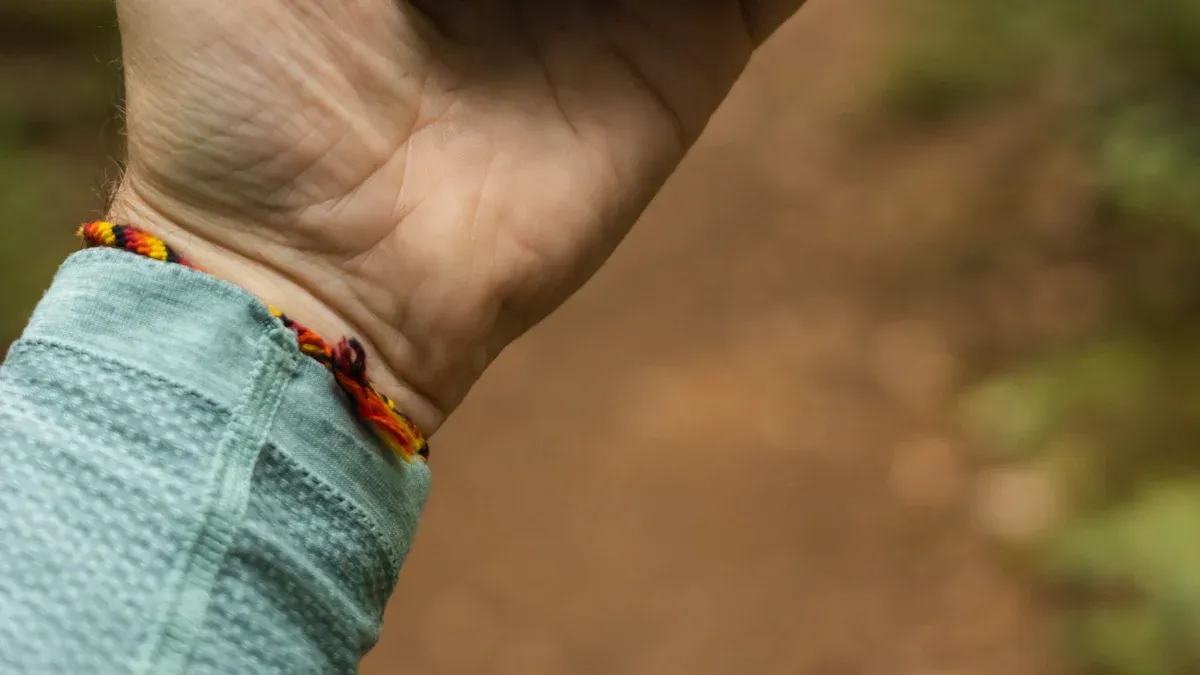
You rely on electronic tags and the best bluetooth trackers for daily peace of mind. AirTag, the best key finder for iPhone users, stands out in finding lost items quickly. With advanced finding features, a bluetooth tracker like AirTag offers instant alerts and seamless integration. You can find misplaced keys, wallets, or bags in seconds, thanks to a 95% recovery rate in urban tests. The best tracker for iPhone users delivers robust finding power and long battery life. For business, Electronic Shelf Labels, ESL Gateway AP, ESL Price Tag, and Esl Retail solutions drive asset finding efficiency.
| Metric / Statistic | Value / Projection | Significance for Everyday Use |
|---|---|---|
| Market Size 2024 | USD 1.5 Billion | Large and growing market indicating widespread use |
| Market Size Projection 2033 | USD 4.2 Billion | Strong growth expected over next decade |
| Fastest Growing Segment | Children tracking (18% CAGR) | Rising focus on safety and security |
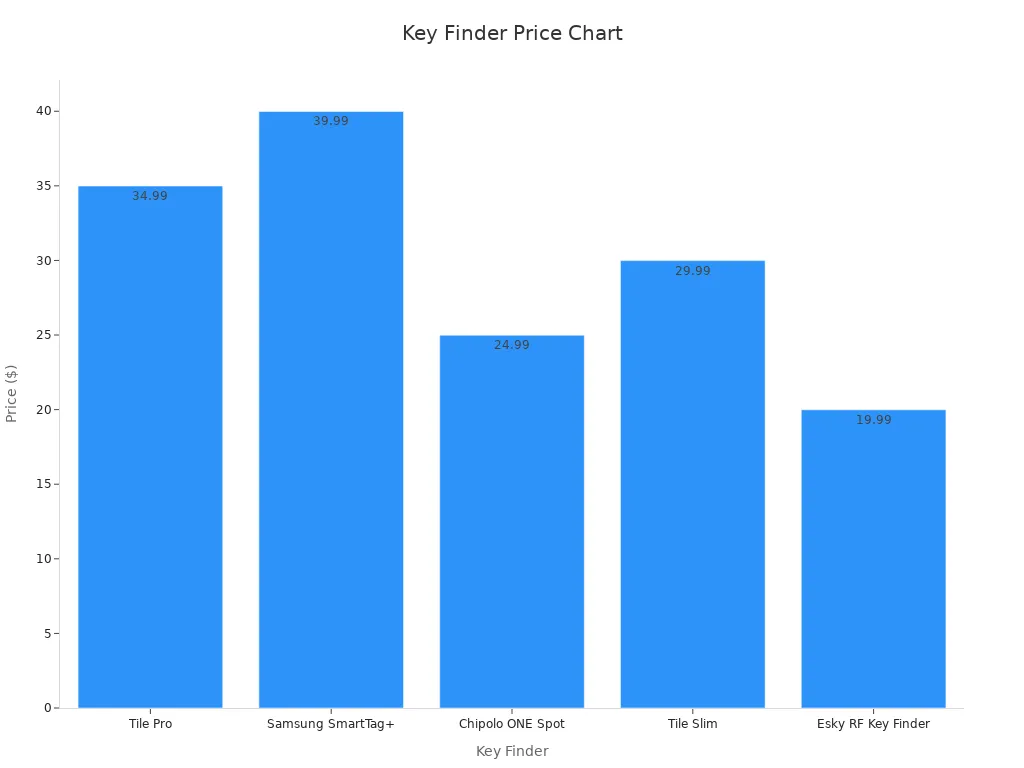
Top Electronic Tags and Best Bluetooth Trackers for 2025
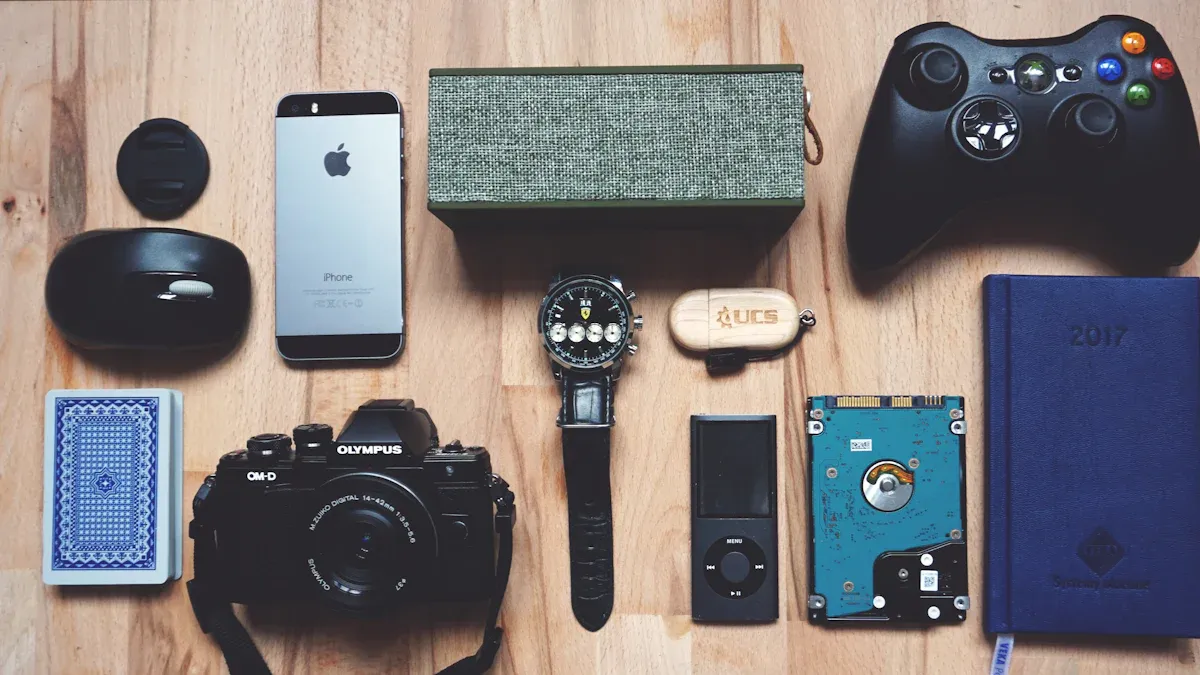
Quick Comparison Table of Best Key Finder and Bluetooth Tracker Options
You want to choose the best bluetooth tracker overall for your daily needs. The market offers a range of options, each with unique strengths. The table below compares the best key finder and bluetooth tracker models for 2025. You can quickly see which tracker fits your lifestyle, whether you use an iPhone, Android, or need a slim design for your wallet.
| Product Name | Ecosystem Compatibility | Range | Battery Life | Alert Volume | Water Resistance | Notable Feature |
|---|---|---|---|---|---|---|
| Apple AirTag | iPhone (iOS) | 100m+ | 1 year | Loud | IP67 | Precision Finding |
| Tile Pro | iOS, Android | 120m | 1 year | Very Loud | IP67 | Replaceable Battery |
| Samsung Galaxy SmartTag2 | Samsung Galaxy | 120m | 1 year | Loud | IP67 | Smart Home Integration |
| Chipolo ONE | iOS, Android | 60m | 2 years | Extra Loud | IPX5 | Out-of-Range Alerts |
| Cube Shadow | iOS, Android | 60m | Rechargeable | Moderate | IP67 | Ultra-Slim Design |
Tip: If you use an iPhone, AirTag offers the best key finder overall experience. For Android or cross-platform use, Tile Pro stands out as the best bluetooth tracker overall.
Summary of Standout Features in Electronic Tags
You benefit from a wide variety of electronic tags and bluetooth trackers. The best bluetooth trackers for 2025 deliver robust tracking, seamless app integration, and reliable alerts. Market data shows that companies like Tile, Chipolo, and Apple AirTag lead the industry with high production volumes and strong financial performance. These brands invest in advanced locator technologies, including GPS, BLE, and beacon systems, to improve tracking accuracy.
You find that electronic tags now support flexible and rigid tag types, including adhesive, RFID, and implantable options. This variety allows you to select the best key finder for keys, wallets, pets, or even children. Multi-modal labeling, such as QR codes and RFID, improves tracking and automation. You can rely on human-readable and machine-readable labels for fast identification.
The best bluetooth tracker overall balances ease of use, automation, and security. You gain peace of mind from features like workflow integration, automated alerts, and robust water resistance. For example, AirTag and Tile Pro both offer IP67 water resistance, making them suitable for outdoor use. You also benefit from workflow metadata and process logic, which ensure traceability and compliance in business settings.
You see that leading trackers like AirTag and Tile use advanced app integration. You receive instant notifications if you leave an item behind. The best key finder overall provides loud alerts, long battery life, and a user-friendly app. You can trust these devices for daily tracking, whether you need to find your keys, wallet, or backpack.
In-Depth Reviews of the Best Electronic Tags
Apple AirTag – Best Tracker for iPhone Users
Key Features
You experience seamless integration with your iPhone when you use Apple AirTag. This tracking device leverages the Find My network, which consists of hundreds of millions of Apple devices worldwide. You benefit from Precision Finding, which uses Ultra Wideband technology to guide you directly to your lost item. The AirTag offers a replaceable battery that lasts up to one year. Its compact, water-resistant design (IP67) ensures durability in daily use. You can attach it to keys, wallets, or bags and receive instant alerts if you leave something behind.
Note: Apple AirTag supports encrypted location data, which enhances privacy and security during tracking.
Pros and Cons
| Pros | Cons |
|---|---|
| Effortless setup with iPhone | Limited Android compatibility |
| Precision Finding for accurate locating | No built-in keyring hole |
| Strong privacy and security features | Requires iPhone for full functionality |
| Loud alert for easy finding | Accessories often sold separately |
| Water and dust resistance (IP67) |
Ideal Use Cases
You find Apple AirTag ideal if you use an iPhone and want the best tracker for iPhone users. Attach it to your keys, wallet, or backpack for daily peace of mind. You can also use AirTag to track luggage during travel or to monitor valuable items at home. The AirTag excels in urban environments, where the dense Find My network increases the chances of finding lost items quickly. You benefit from the best key finder experience when you need reliable, accurate, and secure tracking.
Tile Pro – Best Bluetooth Tracker for Versatility
Key Features
Tile Pro stands out as the best bluetooth tracker overall for users who value versatility. You can use it with both iOS and Android devices. The tracker offers a range of up to 120 meters, making it suitable for finding items in large spaces. Tile Pro features a replaceable battery with a one-year lifespan. Its loud alert helps you find misplaced items even in noisy environments. The Tile app supports community finding, which allows other Tile users to help locate your lost tracker.
- Replaceable battery
- Loud ringer for easy finding
- Water-resistant (IP67)
- Works with voice assistants like Alexa and Google Assistant
Pros and Cons
| Pros | Cons |
|---|---|
| Cross-platform compatibility | Slightly bulkier than some competitors |
| Long range for finding items | Requires app for full functionality |
| Replaceable battery | Community finding depends on user density |
| Loud alert for quick finding | Some features require subscription |
| Durable and water-resistant |
Ideal Use Cases
You find Tile Pro effective if you want a bluetooth tracker that works with both iPhone and Android. Attach it to your keys, bags, or even pet collars. The loud alert and long range make it the best key finder for busy households or workplaces. You benefit from the Tile network, which increases your chances of finding lost items through community finding. Tile Pro suits users who need a reliable tracker for multiple devices and platforms.
Samsung Galaxy SmartTag2 – Best Bluetooth Tracker for Samsung Users
Key Features
Samsung Galaxy SmartTag2 delivers the best tracker for Samsung Galaxy users. You enjoy seamless integration with Samsung’s SmartThings app. The tracker offers a range of up to 120 meters and a battery life of up to one year. Its IP67 rating ensures water and dust resistance. SmartTag2 supports smart home automation, allowing you to control connected devices with a button press. You can use the tracker to find lost items or automate routines in your home.
- Smart home integration
- Replaceable battery
- Loud alert for finding items
- Water and dust resistance (IP67)
Pros and Cons
| Pros | Cons |
|---|---|
| Deep integration with Samsung ecosystem | Only compatible with Samsung Galaxy devices |
| Smart home automation features | Limited third-party app support |
| Long range and loud alert | Slightly larger than some alternatives |
| Durable and water-resistant | |
| Easy battery replacement |
Ideal Use Cases
You find Samsung Galaxy SmartTag2 perfect if you use a Samsung Galaxy smartphone. Attach it to your keys, wallet, or luggage for daily tracking. The tracker excels in smart home environments, where you can automate lights or appliances with a single button press. You benefit from the best bluetooth tracker for Samsung users when you need reliable finding and advanced automation. The SmartTag2 stands out as the best tracker for Samsung Galaxy users who want both tracking and smart home control.
Tip: Regularly review your tracker’s performance and update its firmware to maintain optimal finding accuracy and security. Industry trend analyses show that frequent reviews and updates help you adapt to evolving technology and market needs.
Empirical Data Table: Quality and Performance Metrics
| Evidence Aspect | Empirical Findings and Metrics | Supporting Studies and Details |
|---|---|---|
| Thresholding for Quality | 42% of studies applied thresholding to identify low-quality data using clinical and logical value ranges (e.g., BMI, dates) | Multiple studies including clinical thresholds (BMI 12-90 kg/m2), logical checks (date inconsistencies) |
| Data Uniqueness | Measurement of patient record duplications and proposed data structure to reduce duplicates | Aerts et al. study on duplication frequency and data structuring |
| Data Stability | Temporal statistical analyses of data drift against internal baselines | 15% of articles, including studies [4,8,19,31] |
| Shareability | Manual pre- and posttest reviews showing improved data standardization and shareability | Two studies showing increased shareability after interventions |
| Information Robustness | Statistical estimation of critical vs. noncritical data quality issues | García-de-León-Chocano et al. |
| Interventions Improving DQ | Increased completeness and plausibility checks from 53% to 100% after multiple DQA rounds; improved data completeness and recency; increased shareability from 90% to 98.5% and reduced error sites from 67% to 35% | Walker et al., Puttkamer et al., Engel et al. studies demonstrating effective interventions |
| Recency | Evaluated by hard and soft rule sets, including data entry timeliness within clinically relevant timeframes | 27% of articles, with internal and external standards applied |
| Fairness/Bias | Assessed via manual and automated reviews against internal gold standards and bias criteria | Six articles using manual and automated methods |
| Core DQ Measures | Completeness (81%), conformance (69%), plausibility (62%) widely used as main components of data quality analysis | Majority of studies focusing on these three key metrics |
| Advanced Methods | Use of AI data extractors, large language models, external data repositories, and synthetic data generation to augment data quality | Examples include AI extraction algorithms, cross-referencing with external databases, and GANs for synthetic data |
You see that industry benchmarks and regular product reviews play a crucial role in maintaining high standards for the best bluetooth trackers. Companies use advanced analytics and user feedback to refine features and improve the best key finder and bluetooth tracker overall. Historical sales data and trend analyses show that electronic tags have evolved from simple identification tools to advanced tracking devices with smart features. This evolution justifies the need for in-depth reviews and continuous product improvement.
Chipolo ONE – Best Key Finder for Loud Alerts
Key Features
You want a tracker that delivers instant, unmistakable alerts when you misplace your essentials. Chipolo ONE stands out as the best key finder for loud alerts. This tracker produces one of the loudest ringers in the market, reaching up to 120 decibels. You can easily hear it even in busy environments or from another room. The tracker supports both iOS and Android devices, giving you flexibility across platforms. Chipolo ONE offers a battery life of up to two years, so you do not need to worry about frequent replacements. The tracker uses a replaceable battery, which makes maintenance simple and cost-effective.
You can attach Chipolo ONE to your keys, bag, or even your pet’s collar. The tracker’s water-resistant design (IPX5) ensures durability in daily use. Out-of-range alerts notify you if you leave your item behind, which helps prevent loss before it happens. The Chipolo app provides a straightforward interface for finding your tracker and managing multiple devices.
Pros and Cons
| Pros | Cons |
|---|---|
| Extremely loud alert for easy finding | Shorter range than some competitors |
| Long battery life (up to 2 years) | No smart home integration |
| Replaceable battery | Limited advanced features |
| Out-of-range alerts | Design is bulkier than slim trackers |
| Water-resistant (IPX5) | |
| Works with iOS and Android |
Ideal Use Cases
You benefit from Chipolo ONE if you often misplace items in noisy or crowded places. The loud alert ensures you can find your keys or bag quickly, even when distractions surround you. This tracker works well for students, busy professionals, or anyone who values fast, reliable finding. You can use Chipolo ONE as the best key finder for your home, office, or travel needs. The tracker’s out-of-range alerts help you avoid leaving items behind, which adds an extra layer of security.
If you want the best tracker for your wallet, Chipolo ONE fits well for those who prioritize sound over slimness. The tracker’s robust finding features and easy maintenance make it a practical choice for everyday use. You can rely on Chipolo ONE as the best bluetooth tracker for wallets if you need a loud, dependable alert system.
Cube Shadow – Best Slim Bluetooth Tracker
Key Features
You need a tracker that fits discreetly into your wallet or attaches to slim items without adding bulk. Cube Shadow offers an ultra-slim profile, measuring just 2mm thick. This design makes it the best tracker for your wallet and other compact items. The tracker supports both iOS and Android devices, so you can use it across different platforms. Cube Shadow features a rechargeable battery, which provides up to two months of use per charge. You can recharge it using a standard USB cable, which reduces waste and ongoing costs.
The tracker delivers moderate alert volume, suitable for quieter environments. Cube Shadow includes a separation alert, which notifies you if you leave your item behind. The tracker’s water-resistant construction (IP67) protects it from spills and rain, making it reliable for daily use.
Pros and Cons
| Pros | Cons |
|---|---|
| Ultra-slim design fits wallets perfectly | Moderate alert volume |
| Rechargeable battery | Shorter battery life than non-rechargeables |
| Water-resistant (IP67) | Not as loud as Chipolo or Tile Pro |
| Works with iOS and Android | Higher price point |
| Separation alerts | Limited range compared to Tile Pro |
Ideal Use Cases
You find Cube Shadow ideal if you want the best bluetooth tracker for wallets or other slim items. The tracker’s thin profile allows you to slip it into your wallet, passport holder, or laptop sleeve without adding noticeable bulk. You can use Cube Shadow to track your wallet, luggage tags, or even remote controls. The rechargeable battery appeals to users who prefer eco-friendly solutions and want to avoid frequent battery changes.
Cube Shadow excels in situations where space matters most. If you value a minimalist approach and need reliable finding features, this tracker delivers. You can trust Cube Shadow as the best tracker for your wallet, especially if you want a slim, water-resistant, and rechargeable solution. The tracker’s separation alerts and app integration make finding your lost items straightforward and stress-free.
How to Choose the Right Electronic Tag
Selecting the right tracker for your needs requires careful consideration of several factors. You want a solution that fits your daily routine, supports your devices, and delivers reliable tracking. By focusing on compatibility, connectivity, and battery performance, you can maximize the value of your electronic tags and achieve real-time tracking for your most important items.
Compatibility with Devices and Ecosystems
You should always check if the tracker works with your smartphone or preferred platform. Some trackers only support iOS, while others offer broader compatibility for Android users. The best tracker for android phones often provides seamless integration with Google services and supports real-time tracking through dedicated apps. For a clear comparison, review the table below:
| System | Supported Tag Types | Portability | User Expertise Required | Integration & Accessibility |
|---|---|---|---|---|
| STAT | Argos, GPS only | Web-based, easy to use | Low | Limited to Argos and GPS data |
| CSIRO System | Multiple tag types | Not readily portable | High | Requires dedicated infrastructure and expertise |
| Tagbase | Multiple tag types | Stand-alone, accessible | Low | Broad compatibility, integrates with MS Office, open-source support |
You gain the most from a tracker that matches your device ecosystem. NFC, Bluetooth, and Wi-Fi protocols each offer unique benefits for real-time tracking. NFC supports quick tap-to-find actions, while Bluetooth enables long-distance tracking and precision tracking in crowded environments. The best tracker for android users often supports multiple operational modes, giving you flexibility and ease of use.
Tip: Always verify app compatibility and integration features before purchasing a tracker. This ensures you get real-time notifications and full access to tracking features.
Range and Bluetooth Tracker Connectivity
You need to consider the effective range of your tracker, especially if you want the best bluetooth tracker for long-distance tracking. Bluetooth trackers vary in range due to environmental factors and device specifications. The table below highlights key connectivity statistics:
| Factor | Description | Measurable Range / Values |
|---|---|---|
| Effective Range | Reliable Bluetooth connection distance varies widely depending on conditions | From less than 1 meter to more than 1 kilometer |
| Radio Spectrum | Bluetooth operates in the 2.4 GHz ISM band balancing range and throughput | 2400 to 2483.5 MHz |
| Transmit Power | Power level affects range and energy consumption | -20 dBm (0.01 mW) to +20 dBm (100 mW) |
| Receiver Sensitivity | Minimum signal strength to maintain connection and decode data | Typically -70 dBm to -82 dBm; some implementations reach -103 dBm |
| Antenna Gain | Efficiency and directionality of antenna impact signal transmission and reception | Typically -10 dBi to +10 dBi |
| Path Loss | Signal attenuation due to distance and environmental obstacles | Varies with environment and obstacles |
Bluetooth 6.0 now offers Channel Sounding, which improves real-time tracking accuracy to the centimeter level. This technology supports long-distance tracking and precision tracking, even in complex environments. You benefit from real-time updates and reliable connectivity, making it easier to locate your items quickly. The best bluetooth tracker for long-distance tracking uses advanced antenna designs and optimized power settings to maintain strong connections.
Battery Life and Charging Options
You want a tracker that lasts as long as possible between charges or battery replacements. Battery life depends on usage patterns, environmental conditions, and the type of battery management system. Trackers with replaceable batteries often last up to a year, while rechargeable models may require charging every few months. Battery management systems monitor charge cycles and temperature, helping to extend battery longevity and ensure safe operation.
Manufacturers design trackers to operate within optimal charge ranges, preventing overcharging and deep discharges. This approach, borrowed from electric vehicle battery management, helps your tracker deliver consistent real-time tracking and long-distance tracking performance. When you evaluate how to choose the best key finder, always consider battery life, charging convenience, and the presence of safety features.
Note: Objective criteria such as battery performance, compatibility, and connectivity drive market leadership in electronic tags. You should base your decision on these measurable factors to ensure you select the best tracker for android users or any other platform.
Privacy and Security Features in Electronic Tags
You need to consider privacy and security when selecting electronic tags. These devices collect and transmit sensitive location data, which can impact your personal privacy. Key privacy and security features include:
- GPS tags provide detailed, minute-by-minute tracking, which authorities can access for monitoring or investigation.
- The accuracy of GPS tracking usually falls within ten meters, but urban environments and satellite coverage can affect this precision.
- Data from electronic tags is stored and may be used for purposes beyond tracking, such as crime investigation or policy development, raising privacy concerns.
- Legal safeguards, including data protection laws and access controls, regulate who can access your data and under what circumstances. For example, Article 8 of the European Convention on Human Rights provides a legal framework for privacy.
- Technical features like SIM cards and additional sensors (such as temperature monitoring) enhance functionality but also increase the amount of data collected.
- Continuous monitoring and geofencing can restrict your movements and trigger alerts if you enter prohibited areas.
- Official reports and government documents highlight the complexity and seriousness of electronic tag deployment, emphasizing the need for robust privacy protections.
- Concerns remain about how long data is stored, the risk of misuse, and the reliability of electronic monitoring as forensic evidence.
- Government assessments outline the conditions for data access, focusing on proportionality and justification.
Tip: Always review the privacy policy and security features before purchasing an electronic tag. You should ensure that your data remains protected and that only authorized parties can access your information.
Price and Value for Money
You want to get the best value when investing in electronic tags. The market for these devices continues to grow, driven by demand in retail, logistics, and healthcare. You benefit from technological advancements like ultra-low power consumption and energy-harvesting features, which reduce costs and improve performance. Passive RFID tags offer cost-effective solutions because they do not require batteries.
You may face high initial deployment costs and integration challenges, especially if you run a small or medium-sized business. Regional market growth and innovation help justify different price points, giving you more options to match your budget. Market segmentation by technology, application, and industry allows you to compare products and select the best tracker for android phones or other platforms.
Note: When evaluating price and value, consider not only the upfront cost but also long-term savings from energy efficiency and reduced maintenance.
Durability and Design Considerations
You need a durable electronic tag that withstands daily use and environmental challenges. Studies show that design for durability, ease of maintenance, and repair extends product life and supports sustainable practices. You benefit from tags that allow disassembly and reuse, which improves recyclability and reduces waste.
Technical innovations, such as humidity indicators integrated with 2D barcodes, provide real-time condition monitoring. This feature helps you track the lifecycle of your assets and ensures optimal performance. Laser-engraved 2D barcodes offer high durability and compatibility with recycling, while RFID/NFC tags provide electronic monitoring and withstand harsh conditions. Overmoulded RFID tags deliver excellent durability but may pose recycling challenges due to material integration.
You should balance durability, monitoring capabilities, and recyclability when choosing the best tracker for android users. A well-designed tag ensures reliable performance, easy maintenance, and minimal environmental impact.
Key Features to Consider in the Best Bluetooth Trackers

Tracking Accuracy and Reliability
You need a tracker that delivers consistent tracking accuracy and reliability. The best key finder uses advanced Bluetooth and, in some cases, Ultra-Wideband technology to improve real-time tracking. You can expect different performance levels depending on the model. For example, Samsung SmartTag2 offers a measured Bluetooth range of up to 387 feet and supports live location tracking with a large device network. Apple AirTag provides a basic directional arrow and real-time tracking, but its range is shorter at about 35 feet. You should always consider the network size and the technologies used, as these factors impact both long-distance tracking and precision tracking.
| Tracker Model | Bluetooth Range | Technologies Used | Tracking Features |
|---|---|---|---|
| Samsung SmartTag2 | Up to 387 ft | BLE, UWB | Live location, location history, AR interface |
| Apple AirTag | About 35 ft | BLE | Directional arrow, no location history |
You benefit from real-world reliability testing, which attaches trackers to valuables for months to assess signal range and ease of finding. These practical tests show that the best bluetooth tracker for long-distance tracking must combine a strong network, robust signal, and user-friendly finding features.
App Integration and User Experience
You want a tracker that integrates seamlessly with your smartphone app. Efficient app integration ensures you can manage real-time tracking, receive alerts, and customize settings with ease. Companies like Tile and Fitbit have addressed challenges such as device compatibility, battery efficiency, and intuitive user interface design. You experience better finding and tracking when the app follows Bluetooth standards and uses energy-efficient communication.
- Tile optimized battery life through energy-saving protocols.
- Fitbit ensured cross-platform compatibility for smooth real-time tracking.
- Philips Hue focused on simple, intuitive app design.
- Starbucks prioritized beacon standardization and rigorous testing.
You should look for a tracker with a user-centric app that supports real-time notifications, easy device management, and privacy controls. This approach improves your overall finding experience and ensures you can track items efficiently.
Alert and Notification Options for Key Finders
You rely on loud, customizable alerts to make finding your items quick and stress-free. The best key finder offers a range of notification options, including multiple ringtones, disconnect alerts, and integration with virtual assistants. Alert loudness varies by model, with some trackers like KeyRinger reaching up to 106 decibels. Chipolo One provides 15 ringtone choices and a loud 82.3 dB alert, making finding easier in noisy environments. Tile Pro and Samsung Galaxy SmartTag also offer programmable actions and multiple ringtone options.
| Key Finder Model | Alert Loudness (dB) | Notification Features |
|---|---|---|
| Kimfly Bluetooth Tracker | 62.9 | Basic alarm sound |
| KeyRinger | 106 | Extremely loud, no phone needed |
| Chipolo One | 82.3 | 15 ringtones, phone finding, app integration |
| Tile Pro | 60.1 | Multiple ringtones, large user network |
| Samsung Galaxy SmartTag | Loud | Programmable actions, requires WiFi/cellular |
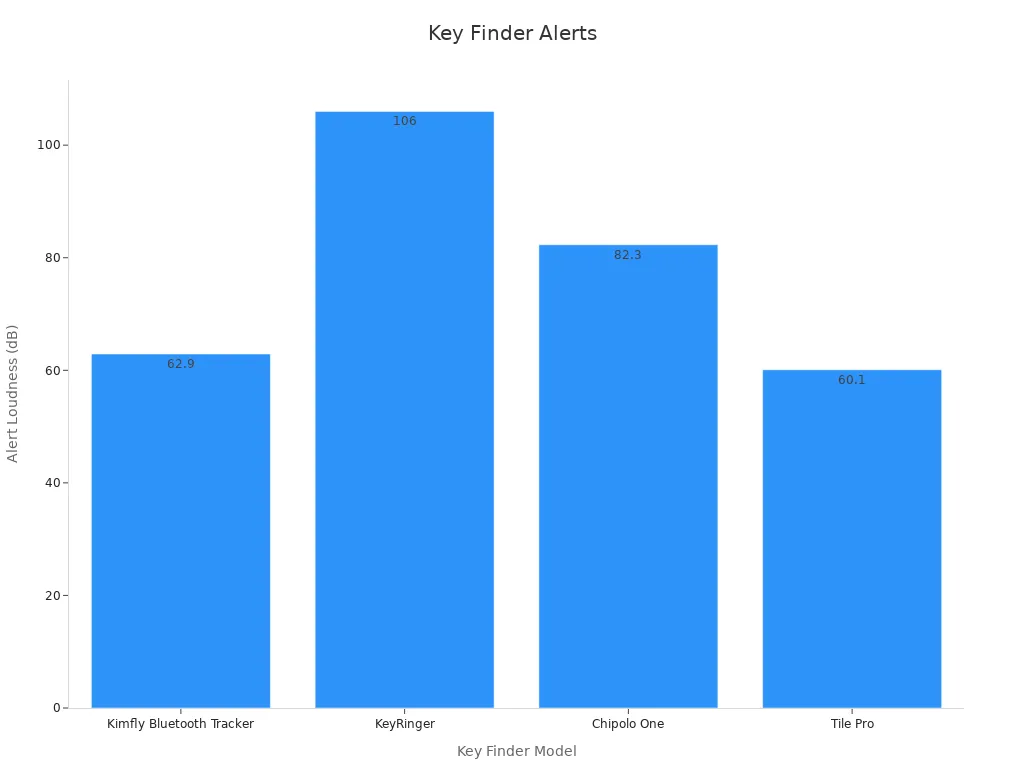
You should select a tracker that matches your environment and finding needs. Loud alerts, variety in ringtones, and real-time notifications help you find items quickly, whether at home or in busy public spaces.
Water and Dust Resistance in Electronic Tags
You expect your electronic tags to withstand daily challenges, including exposure to water and dust. Manufacturers design these devices with robust enclosures to protect sensitive electronics from environmental hazards. Water and dust resistance play a critical role in ensuring your tracker continues to function, whether you drop your keys in a puddle or carry your wallet through a dusty construction site.
To validate these claims, manufacturers subject electronic tags to rigorous environmental resistance tests. Accredited laboratories, such as Nemko, perform a series of standardized procedures. These include spraying, splashing, flushing, and even submerging tags in water tanks. For dust resistance, technicians use dust circulation chambers and specialized probes to simulate real-world conditions. These tests follow international standards like IEC 60529, which defines the Ingress Protection (IP) ratings you often see on product packaging.
Tip: Always check the IP rating before purchasing a tracker. Higher numbers indicate better protection against water and dust.
The following table summarizes the main environmental resistance tests and the standards that support water and dust resistance claims:
| Test Type | Description | Relevant Standards / Ratings |
|---|---|---|
| Water Ingress Testing | Evaluates protection against water exposure, including spraying, splashing, and submersion | IEC/EN 60529, IPx1 to IPx8 |
| Dust Ingress Testing | Assesses defense against solid particles like talcum powder | IEC/EN 60529, IP5x, IP6x |
| Corrosion (Salt Fog) | Simulates corrosive environments using salt spray to estimate product durability | ASTM B117, IEC 60068-2-11, ISO 9227 |
| Climatic Testing | Tests performance under cycles of temperature and humidity | Various climatic test standards |
You find that most leading electronic tags, such as AirTag, Tile Pro, and Samsung Galaxy SmartTag2, carry IP67 ratings. This rating means the device resists dust completely and can survive immersion in water up to one meter for 30 minutes. Some trackers, like Chipolo ONE, offer slightly lower water resistance (IPX5), which protects against splashes but not full submersion.
Manufacturers also conduct corrosion testing using salt spray chambers. This process estimates how well the tag’s materials withstand harsh, corrosive environments, such as coastal areas or industrial sites. Climatic chambers further test the tag’s ability to operate across a wide range of temperatures and humidity levels.
You benefit from these rigorous tests because they ensure your electronic tag remains reliable in unpredictable conditions. Whether you use your tracker outdoors, at the gym, or during travel, you can trust that a high IP rating and proven durability will keep your device functioning when you need it most.
Common Concerns and Solutions for Electronic Tags
Security and Data Privacy in Bluetooth Trackers
You may have concerns about how electronic tags handle your data during tracking and finding. Privacy remains a top issue for many users. Recent surveys show that nearly half of respondents worry about privacy when using AI-powered devices, including trackers. The table below highlights key findings from several consumer studies:
| Survey / Study | Key Consumer Concern Findings |
|---|---|
| Brookings Institution (2018) | 49% of respondents worry AI will reduce privacy; 34% uncertain about AI’s privacy impact |
| Pew Research Center (2023) | Mixed acceptability of AI uses, especially for personal data |
| Forbes Advisor Study | 48-55% comfortable with AI analyzing some data, but only 21% with phone conversations |
| Study on Personal Voice Assistants (2019) | 7% of non-users cite privacy as the main reason for non-use |
| PwC Study on Voice Assistants | 40% of users concerned about voice data handling |
| ACM Study on “Always Listening” Feature | Privacy concerns increased after learning about always listening |
You benefit from advanced security features in modern Bluetooth trackers. These devices use encrypted data transmissions and controlled user access to protect your information. Motion and environmental sensors log events with timestamps, supporting compliance and risk management. Real-time monitoring and automated alerts help you prevent asset loss and unauthorized actions. Manufacturers also provide historical logs and automated reports to support audits and privacy compliance. When you choose a tracker, look for adherence to modern security protocols and protected updates to keep your data safe.
Lost Connection Issues and Troubleshooting
You may experience lost connections with your tracker during daily tracking or real-time tracking. This issue can prevent you from finding lost items quickly. Most connection problems have simple solutions. Follow these steps to restore your tracker’s connection:
- Ensure Bluetooth is enabled on your phone.
- Confirm the tracker is fully charged.
- Turn the tracker on.
- Sync or configure the tracker using the app.
If these steps do not resolve the issue, contact customer support for further assistance.
Wireless interference often causes lost connections. When multiple devices transmit on the same frequency, data packets may collide or become corrupted. Bluetooth technology uses adaptive frequency hopping and spread spectrum techniques to avoid busy channels and maintain reliable connections. Trackers transmit small, fast data packets, which reduces the chance of lost data and improves efficiency. These technical features help your tracker maintain real-time tracking, even in crowded environments.
Tip: Place your tracker and phone away from other wireless devices to reduce interference and improve connection stability.
Battery Replacement and Maintenance for Key Finders
You want your tracker to deliver reliable tracking and finding without frequent interruptions. Battery life and maintenance play a key role in keeping your tracker ready for real-time use. The table below summarizes battery life, replacement frequency, and costs for popular key finders:
| Key Finder Model | Battery Life | Battery Type | Replacement Frequency | Warranty Period | Price Range |
|---|---|---|---|---|---|
| General Key Finders | 6 months to 3 years | CR2032 coin cell or non-replaceable | Every 6 to 18 months (varies by model) | 1 to 2 years | $20 to $35 |
| Tile Mate | 3 years (non-replaceable) | Non-replaceable | N/A | 1 year limited | $25 |
| Apple AirTag | 1 year | Replaceable (CR2032) | Annually | 1 year | N/A |
| Chipolo One Spot | 1 year | Replaceable (CR2032) | Annually | 2 years | N/A |
You should check your tracker’s battery status regularly. Replace the battery according to the manufacturer’s guidelines to avoid losing tracking capabilities. Most key finders use affordable CR2032 coin cell batteries, which you can replace easily. Some models, like Tile Mate, use non-replaceable batteries and require you to purchase a new tracker after the battery expires. Always factor in battery life and replacement costs when choosing a tracker for long-term tracking and finding of lost items.
Cost Over Time of Electronic Tags
When you consider electronic tags for everyday use, you must look beyond the sticker price. The true cost of ownership includes several factors that impact your budget over months and years. Over the past decade, RFID and electronic tag prices have dropped, making these technologies more accessible. Lower costs have improved return on investment (ROI) by boosting efficiency and productivity. However, you will notice that upfront expenses can still vary widely. Tag type, volume, and system complexity all influence your initial outlay. Higher initial investments often bring greater automation and long-term benefits, but you need to weigh these against your operational goals.
Note: Cost considerations extend far beyond the initial purchase. You should always factor in ongoing expenses and the specific use case for your tags.
You will encounter several categories of costs when deploying electronic tags:
- Initial Hardware Costs: You pay for electronic shelf labels, gateways, and other hardware. Factors like label size, display technology, battery life, and quantity affect the price.
- Software Costs: You may choose between basic open-source solutions and advanced enterprise applications. Licensing, integration with systems like ERP or POS, and customization add to the total.
- Installation and Deployment: Skilled labor is often required, especially in complex environments. This increases your upfront labor costs.
- Operation and Maintenance: You must budget for battery replacements, hardware repairs, and regular inspections. These recurring expenses keep your system running smoothly.
- Integrator and Support Costs: Working with experienced integrators can raise your initial costs, but you gain valuable expertise and ongoing support.
| Cost Category | Typical Expenses | Notes |
|---|---|---|
| Hardware | $20–$50 per tag | Varies by tag type and features |
| Software | Free–$10,000+ (one-time/license) | Open-source to enterprise-level solutions |
| Installation | $500–$5,000+ (project-based) | Depends on environment complexity |
| Maintenance | $2–$10 per tag/year | Includes batteries, repairs, inspections |
| Support/Integration | $1,000–$20,000+ (project-based) | Optional, but adds expertise and reliability |
You also need to consider ongoing licensing fees for some passive RFID technologies. Maintenance costs, such as battery replacements for active tags and staff training, add up over time. The total cost of ownership depends on how you balance system capabilities, accuracy, tag quantity, and maintenance—not just the initial price.
Despite higher upfront costs, you often see long-term savings through labor reduction and improved efficiency. These benefits can outweigh the initial investment, but you must plan for continuous operational expenses. When you evaluate electronic tags, always align your budget with your long-term goals and operational needs. This approach ensures you maximize value and avoid unexpected costs as your system grows.
You have many strong options for electronic tags and Bluetooth trackers. Apple AirTag, Tile Pro, and Samsung SmartTag2 each excel for different users. You should focus on compatibility, tracking accuracy, and battery life when choosing. The market for these devices continues to grow, with a projected value of $28.49 billion by 2034. Real-time tracking matters most to 60% of shoppers, and 91% actively track packages, as shown below.
| Metric | Value |
|---|---|
| Market Size (2025) | USD 5.43 Billion |
| Market Size (2034) | USD 28.49 Billion |
| CAGR (2025-2034) | 20.2% |
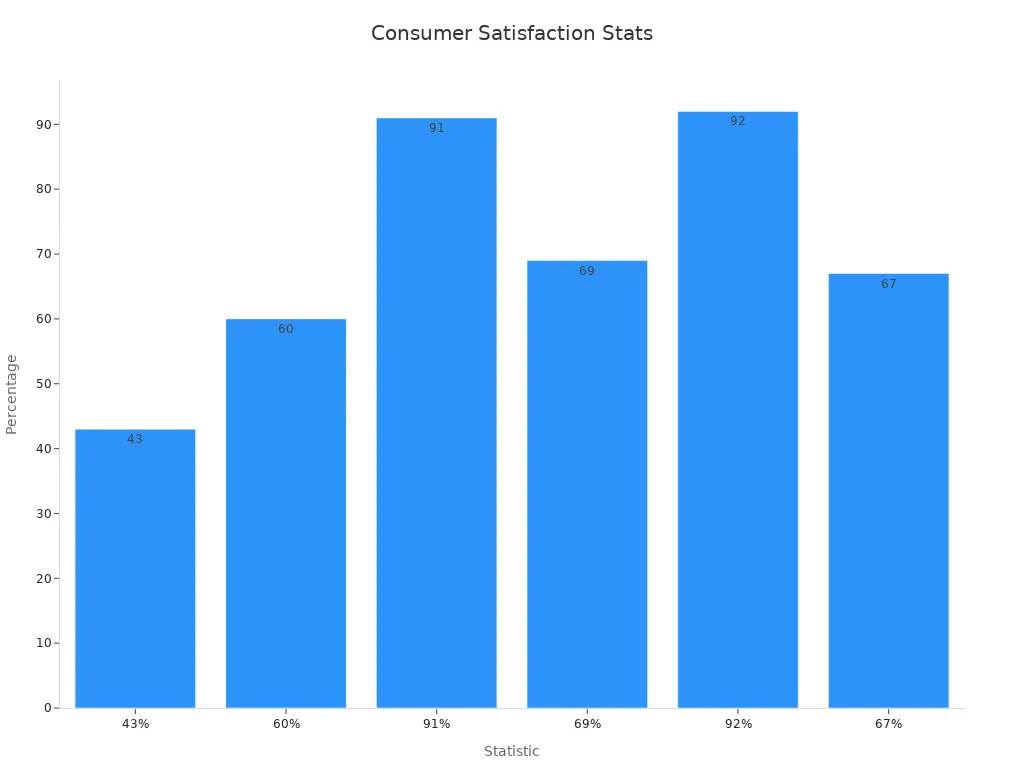
You should match your choice to your budget, need for advanced features, or family use. Assess your priorities before you buy to ensure the best fit.
FAQ
What is the difference between Bluetooth trackers and GPS trackers?
Bluetooth trackers use short-range wireless signals to help you find nearby items. GPS trackers use satellite signals for real-time location tracking over long distances. You should choose Bluetooth for everyday items and GPS for vehicles or assets that move far from you.
How do you replace the battery in most electronic tags?
You usually open the tag’s back cover and swap the old battery for a new one, such as a CR2032 coin cell. Always check the manufacturer’s instructions for your specific model to avoid damaging the device.
Can you use multiple trackers with one smartphone?
Yes, you can manage several trackers through a single app on your smartphone. Most leading brands let you add, name, and monitor multiple devices at once. This feature helps you track keys, wallets, and bags from one dashboard.
Are electronic tags waterproof?
Many electronic tags have water resistance ratings like IP67 or IPX5. These ratings mean the device can handle splashes or brief submersion. Always check the product’s IP rating before using it in wet environments.
What should you do if your tracker loses connection?
First, check your phone’s Bluetooth settings and ensure the tracker has power. Move closer to the tracker and restart the app. If problems persist, consult the manufacturer’s troubleshooting guide or contact support.
Do electronic tags work internationally?
Most Bluetooth trackers work worldwide, as Bluetooth is a global standard. GPS trackers also function in most countries. However, some features, such as community finding or smart home integration, may depend on local network availability.
How secure is your location data with electronic tags?
Manufacturers use encryption and privacy controls to protect your data. You should review the privacy policy and enable security features in the app. Always update your device’s firmware to maintain the highest level of protection.


